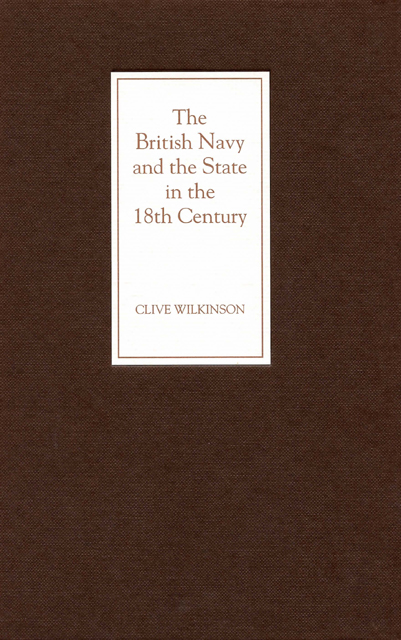Book contents
- Frontmatter
- Contents
- Foreword
- Acknowledgements
- Abbreviations
- 1 The Myth of a Paper Fleet
- 2 Government and the Navy
- 3 ‘Treating the House with Contempt’: British Naval Finance in the Eighteenth Century
- 4 Crisis and Victory: The Navy, 1714–62
- 5 The Peace Establishment I: Demobilization and Retrenchment, 1763–6
- 6 The Peace Establishment II: Stability, Innovation, and the Falklands, 1766–70
- 7 Sandwich, Parliament and the Paper Fleet, 1771–9
- 8 Conclusion
- Appendix 1 Extraordinary Estimates 1750–76
- Appendix 2 Extraordinary Estimate, Navy Office, 2 February 1767
- Appendix 3 Estimate of Monies Needed (ADM B 177, 5 August 1765)
- Appendix 4 ‘Plan of Expense of His Majesty’s Navy for the Year 1768’ (ADM B 181, 27 May 1768)
- Appendix 5 Account of the Course of the Navy (Fragment, ADM B 183, 6 August 1770)
- Appendix 6 A List of the Ships of the Royal Navy, 1 January 1763, with the Condition of the Navy on Survey (ADM 7 553)
- Appendix 7 British Battlefleet 1714–80
- Appendix 8 Environmental Impact on the Navy’s Ships, 1710–80
- Appendix 9 Naval Finance and Expenditure
- Appendix 10 The Procedure for Voting a Supply to the Navy
- Bibliography
- Index
8 - Conclusion
Published online by Cambridge University Press: 18 March 2023
- Frontmatter
- Contents
- Foreword
- Acknowledgements
- Abbreviations
- 1 The Myth of a Paper Fleet
- 2 Government and the Navy
- 3 ‘Treating the House with Contempt’: British Naval Finance in the Eighteenth Century
- 4 Crisis and Victory: The Navy, 1714–62
- 5 The Peace Establishment I: Demobilization and Retrenchment, 1763–6
- 6 The Peace Establishment II: Stability, Innovation, and the Falklands, 1766–70
- 7 Sandwich, Parliament and the Paper Fleet, 1771–9
- 8 Conclusion
- Appendix 1 Extraordinary Estimates 1750–76
- Appendix 2 Extraordinary Estimate, Navy Office, 2 February 1767
- Appendix 3 Estimate of Monies Needed (ADM B 177, 5 August 1765)
- Appendix 4 ‘Plan of Expense of His Majesty’s Navy for the Year 1768’ (ADM B 181, 27 May 1768)
- Appendix 5 Account of the Course of the Navy (Fragment, ADM B 183, 6 August 1770)
- Appendix 6 A List of the Ships of the Royal Navy, 1 January 1763, with the Condition of the Navy on Survey (ADM 7 553)
- Appendix 7 British Battlefleet 1714–80
- Appendix 8 Environmental Impact on the Navy’s Ships, 1710–80
- Appendix 9 Naval Finance and Expenditure
- Appendix 10 The Procedure for Voting a Supply to the Navy
- Bibliography
- Index
Summary
When John Montague, Earl of Sandwich, left the Admiralty at the end of March 1782, the war with America was lost. Cornwallis had surrendered his army the previous October and, in the following spring, the North administration collapsed. With the colonies lost, Britain turned her undivided attention to the defeat of America’s allies. This was now a maritime war with no distraction of fighting on the American continent. On 17 April 1782, in the very month that Augustus Keppel took over as the First Lord of the Admiralty, George Rodney crushed the French at the Battle of the Saintes in the West Indies. Britain had been defeated in America but at much the same time had been at war with France, Spain and the Netherlands and faced the hostile neutrality of the Baltic powers. Britain’s European enemies gained virtually nothing from the war. Once the issue of American independence was decided, a strong Navy ensured success in Britain’s maritime war. Despite being a political liability and discredited, Sandwich must be acknowledged for producing a strong Navy at the end of this unpopular and disappointing conflict.
Sandwich’s administration suffered from being the focus of political discontent against the North government and the dispute with the American colonies. In previous decades the Admiralty would have been allowed to get on with its work with little interference from Parliament. Sandwich suffered unprecedented probing into the affairs of the Navy. He was expected to account for his every action and was blamed for matters that were beyond his control or not within his responsibilities. Some of the criticism was justified but in the later stages of his administration, particularly after the entry of France into the war in 1778, the criticism was entirely politically motivated. Sandwich had inherited the stewardship of a strong Navy in 1771. Sandwich called it a ‘paper fleet’ and this defence was to some extent political rhetoric on his part. He did, however, inherit a fleet facing a new stage in a recurrent problem.
The fleet began to deteriorate during the early 1770s. There were also many very old and unserviceable vessels that needed to be disposed of. The combination of these two factors caused consternation and alarm among some naval officers.
- Type
- Chapter
- Information
- The British Navy and the State in the Eighteenth Century , pp. 209 - 212Publisher: Boydell & BrewerPrint publication year: 2004

